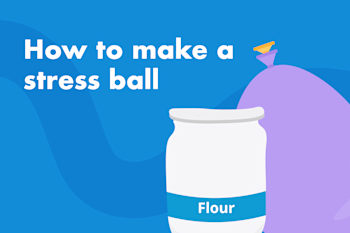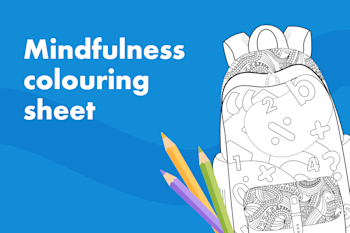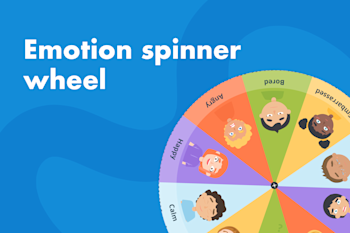The best mental health activities for kids

We all think of childhood as the most fun, carefree years of our lives. But even kids can experience a lot of daily stressors, so it’s important to keep their mental health in mind. That’s why we’ve put together some mental health activities for kids that’ll help them manage their less than carefree days.
There are moments that feel like we’re all going through some difficult times – you’d be surprised how much children can pick up on things they saw on the TV, heard on the street or sensed in conversations around them. Making sure you can talk to your children about difficult situations is a good start, but empowering them to manage their mental health in the long run can be really beneficial in keeping them happy, healthy and ready to learn.
What benefits do mental health activities for children offer?
Mental health activities for children offer several benefits, including:
Emotional awareness: they help children understand and express their emotions more effectively.
Stress reduction: these activities can significantly reduce stress and anxiety in kids.
Improved coping skills: they teach children how to cope with challenges and difficult emotions.
Enhanced communication: they can help kids learn to communicate their feelings and thoughts more clearly.
Resilience building: such activities build resilience, enabling children to recover from disappointments more easily.
How do you teach kids about mental health?
Teaching kids about mental health can be effectively done by introducing the topic through playful and engaging mental health activities. These activities can make learning about emotions and mental wellbeing fun and accessible, allowing children to explore the concepts of mental health in a comfortable and interactive manner.
Mental health activities for kids
If you’re ever at a loss for what to suggest when your child is struggling with their mental health, there are a lot of things they can do to help. Things like finding a quiet place to do some reading, particularly children’s books about mental health, can be very helpful as a coping mechanism for your child.
For a lot of these mental health activities you can join in if you think that might help your child, or give them a quiet space to do this on their own. Here are the best mental health activities for kids:
Create a journal
Children don’t always have an easy time verbalising how they feel, whether that’s down to not fully understanding how they feel or being worried to talk directly to you about their feelings. This can stem from worrying about being judged or having their feelings dismissed.
While you can always reassure your child that you’ll listen and would never dismiss their feelings, you can also remind them that there are non-verbal outlets for their emotions, like keeping a journal.
You can make journaling exciting by providing your child with coloured pens and stickers, so they can express themselves creatively while they write. And while the goal is to improve their mental health, journaling can also help children keep working on their handwriting skills.
Sensory toys
A lot of children can find relief from anxiety or stress through sensory experiences and toys. For many children that could just be taking some time to play with their favourite toys.
Some children can benefit from toys specifically designed to help with stress, like stress balls, fidget toys, play dough or slime putty. These sensory toys provide a good distraction and can help give children something to focus on particularly if they struggle with their focus.
You can make your own stress ball at home, and you can do this with your child as a fun activity. To make a stress ball you’ll need:
Two balloons
A funnel
Some rice or flour
To make the stress ball:
Put one balloon inside the other (it’ll be much easier to do this first)
Fill the inner balloon with rice or flour using the funnel to help
Once the balloon is completely full, tie off the end
Tie the second balloon separately to make it really secure

Get creative
Creating art is a fantastic way for children to work through their emotions and manage their mental health. It’ll really give them something to focus on and let out what’s inside their head, without the need for any words.
Provide your child with paints, coloured pencils, felt tips and something to draw or paint on, and make sure you provide a suitable surface (either a table covered in a protective cloth or just an old table that you don’t mind getting stained with paints or pen marks) and watch as they create.

Get outdoors
You probably know yourself that going outdoors can be a fantastic way to clear your head, even just for a quick walk. So try doing the same with your children.
Even indoor activities can be done outside, like painting, colouring, reading, writing, eating lunch or even playing board games. Whatever your child is in the mood for, why not try encouraging them to do it outdoors for some fresh air and see if it’ll help clear their head?
Set up a safe space indoors
The outdoors won’t always be suitable, sometimes the weather just won’t allow a nice day outside. So for those days, try setting up a safe space for your children indoors.
Setting up a reading corner with a good selection of children’s books can provide your child with somewhere to go when they feel like they need to be alone. You could even build them a blanket or pillow fort over the weekend, so they have somewhere they feel they can hide away if they need to. Explain to your child that the space is for them when they want to have a quiet moment or if they feel like their head is a bit noisy. You can demonstrate that you respect their boundaries here too by always asking before going into their safe space.
Kid’s mental health – teaching good mindfulness practices
It’s never really too early to talk to your children about mental health, as starting off with good habits can help them manage their wellbeing better as they grow up. Teaching them healthy coping mechanisms early on will mean they understand how to cope with periods of low mood and not great mental health. We also have some great self-care for children tips.
Let’s take a look at some ways to start off teaching children some good mental health practices early.
Encourage good mental health habits for kids
You’re a huge role model for your child and can have a brilliant impact on their lives by demonstrating good mental health habits. When it comes to demonstrating a healthy relationship with mental health for kids think of:
Expressing your emotions calmly and confidently
Demonstrating healthy coping mechanisms to calm yourself down
Getting help when you need it and being honest about that.
Lead by example and show your child that it’s okay to sometimes prioritise your mental wellbeing where possible, and take steps to manage your mental health.
Sleep hygiene
A good night’s sleep can make all the difference when it comes to mental wellbeing and that couldn’t be more true than when it comes to children. You’ll probably have already noticed that children get cranky or upset when they’re especially tired, after all.
Teach them about good sleeping habits early on, so they can get the rest that they need. That means:
Having a regular sleeping schedule, going to bed at the same time every day even on holidays and weekends
Turning off devices an hour before bed so can unwind and avoid screen lights
Having a before bed ritual that can help them sleep, like reading a book or being read to.
Emotional check-ins
Regularly checking in on their emotions is a good way to keep on top of your kid’s mental health. Just like you, they’ll have lots of complicated feelings to deal with each day and might sometimes struggle to express them without prompting.
You might notice your child acting out or having tantrums from time to time, which is usually a good sign that they might need to talk about something. So calmly ask your child to try to explain what they’re feeling and why they think it might be making them act that way. Encourage them to be honest about what might have caused that feeling.

Helping your child identify and name their emotions early on can really help them get a sense of their feelings, and how to cope with them.
Self-esteem and body image
Sadly, studies have shown that even children as young as three can struggle with their body image. Even young children can pick up on things they don’t like when they look in the mirror, and as children get older the presence of social media and advertising can trigger issues with their body image and self-esteem.
So, early on in your child’s life, encourage them to do things like say some positive affirmations in the mirror. Get them to pick out things that they like about themselves (you can always give them some prompts, like asking if they like their hair colour or their eyes). Teach your child to focus on those parts of themselves.
As they get older and start to notice things like ‘the perfect body’ in magazines and advertising, remind them that their appearance doesn’t define their worth (and that images in magazines and advertising are very edited to make people look better than they do!). Remind your child that their body is amazing because of what it can do (like run really fast, dance beautifully or how strong they are) and not because of the way it looks.
Talk about your kid’s mental health often
Make talking about mental health a part of your daily routine to check in with how they’re feeling. It doesn’t have to be an obvious “how is your mental health?” question if you feel that they might not respond well to that. Just start simple, with things like asking how their day was, how school went and if they enjoyed their classes today.
If your children do start to struggle with talking about their mental health as they get older, think of mental health activities you can do together where they can talk to you without it being a face-to-face conversation. Cooking, reading, travlling in the car or even sitting down to watch a film together can be surprisingly good times for your child to open up if they’re having a difficult time with their mental health, as these activities can take a little bit of pressure and focus off them.
Normalising talking about mental health is a good way to teach children early on that it’s okay to talk about what they’re struggling with, and that there are people in their lives to listen and help.
Remind them they’re not alone
This is the most important part of all when it comes to helping with your kid’s mental health – remind them that you’re there for them and that you’ll always listen and help in any way you can. Remind your child that going through a difficult time with their mental health is nothing to be ashamed of – a lot of people do, and one in four people will experience mental health problems in their lifetimes. So reassure your child that whatever they’re going through isn’t something they’re alone in and that you’ll be there to help them through it.
Mental health games for kids
Mental health activities for kids can be both fun and educational. Games can be an excellent way to make these activities enjoyable for children. Here are some mental health games you can create and play with your kids:
Feelings bingo: create bingo cards with various emotions instead of numbers. Kids can take turns acting out different emotions without using words and you can guess the feelings being portrayed.
Storytelling cards: like the bingo cards, develop a set of cards with various emotions, characters and settings. Kids can draw cards and create short stories that explore how different characters handle emotions.
Mental health in school
When children begin to struggle with their mental health, it can have an impact on their learning. Poor mental health in school can lead to struggles with:
Attendance
Attainment
Progression in their learning
Engagement with other students and struggling to make friends
Low energy
So it’s important to teach your children to have a healthy relationship with their mental health. That means a variety of coping mechanisms and healthy, open conversations about mental health as we mentioned earlier.
If you are worried about your child’s mental health in school, reach out to their school. If your school does have any kind of counselling provision, they could help your child in identifying what they’re experiencing and ways to work through it.
If your school doesn’t have any counselling available, even just making teachers and staff aware that your child is experiencing difficulty can make a huge difference. If teachers are aware that your child might need an extra helping hand with their learning while they’re struggling, they can try to prevent some of the impact of poor mental health on learning.
Back to school mental health impact
While the feelings your child is experiencing can be a result of a lot of different things, going back to school can be a point of stress for your child.
So if you’re noticing that in the run up to the new term your child is struggling, explore coping tools for back to school anxiety, talk to them about it, and encourage them to be honest with their feelings.
We have plenty of back to school resources to help your child if they’re worried about term time starting up again. Let us help you send them back to school with a smile.
Cancel anytime
No joining fee
In centre or online
Memberships to suit you
Cancel anytime
No joining fee
In centre or online
Memberships to suit you
Cancel anytime
No joining fee
In centre or online
Memberships to suit you




